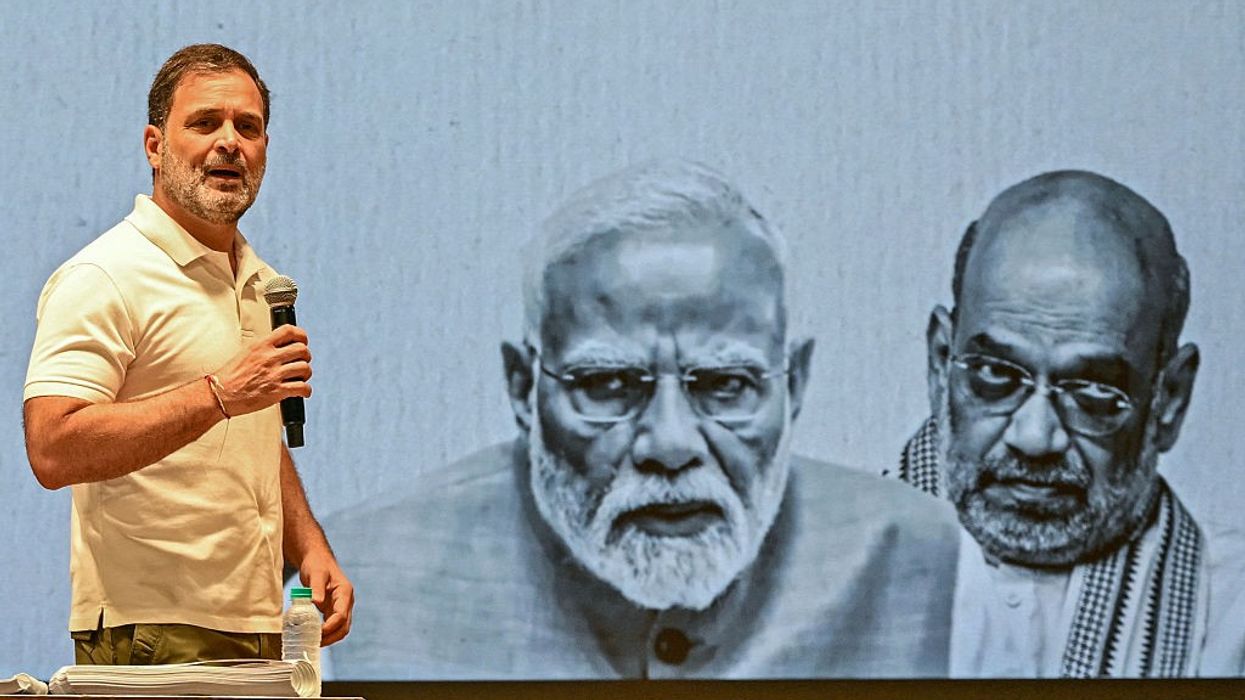INDIA's opposition leader Rahul Gandhi made explosive allegations on Thursday (7), claiming he had evidence of "huge criminal fraud" in India's elections perpetrated by the ruling BJP through the Election Commission. He described this as a "crime" against the Constitution.
Congress leader Gandhi said the judiciary needed to intervene because "the democracy that we love so much does not exist".
Speaking at a press conference at the All India Congress Committee's Indira Bhawan headquarters in New Delhi, Gandhi presented an analysis of electoral data from Karnataka's Bangalore Central Lok Sabha constituency during the 2024 elections.
Gandhi said his party had expected to win 16 seats in Karnataka based on internal polling, but secured only nine. The party then examined the seven unexpected losses, focusing on the Mahadevapura Assembly segment within Bangalore Central. "All the data we have here is from the 2024 elections, sourced from the Election Commission," he said.
According to Gandhi's analysis, in the 2024 Lok Sabha elections, the BJP secured 658,915 votes in the Bangalore Central seat, winning by a margin of 32,707 votes.
In the Mahadevapura assembly segment specifically, Congress received 115,586 votes while the BJP garnered 229,632 votes. "The Congress won all the assembly constituencies except Mahadevapura, where the BJP swept and secured a victory margin of 114,046 votes. This seat significantly contributed to their election win," he explained.
Gandhi claimed there was systematic "vote stealing" of approximately 100,250 votes in the Mahadevapura segment, alleging 11,965 duplicate voters, 40,009 voters with fake and invalid addresses, 10,452 bulk voters registered to single addresses, 4,132 voters with invalid photographs, and 33,692 voters misusing Form 6 new voter registration forms.
Supporting his allegations with data displayed on screens, Gandhi showed examples of what he termed fake voters, duplicate voters, and single-address voters.
"This is Election Commission data, and the EC claims it is conducting free and fair polls. In one assembly segment, 100,000 fake voters are there. We are telling the people of the country, this is your future. The whole system is being stolen," he asserted.
Gandhi alleged this pattern existed across multiple states. "We see there is a pattern. We are absolutely convinced that this crime is being done on a huge scale across the country, state after state after state." He claimed the Election Commission was destroying evidence, including CCTV footage and voter lists.
The press conference came after the Election Commission demanded Gandhi provide a signed declaration regarding his claims.
Gandhi dismissed this requirement. "I am a politician. What I say to the people is my word. I am saying it to the people publicly - take it as an oath," he said. "Interestingly, they haven't denied the information. They haven't said the voter lists are wrong. They are saying Rahul Gandhi should say it under oath... they know the truth."
Gandhi demanded the Election Commission provide electronic voter data from the past 10-15 years and share CCTV footage from polling stations.
"If the Election Commission now does not give us electronic voter data of the last 10-15 years, and if it does not share the CCTV footage, they are taking part in the crime," he said.
He called for judicial intervention, saying: "I think the judiciary needs to get involved in this. We need to understand what is going on, because what we love so much - our democracy - doesn't exist."
The BJP termed Gandhi's allegation of poll fraud against the Election Commission a “calculated deceit” and accused the Congress of “systematically” attacking constitutional institutions under a larger conspiracy against India's democracy and the Constitution.
Senior leaders of the ruling party took on Gandhi for questioning election results, with Indian minister Dharmendra Pradhan labelling him "bayan bahadur" (someone who makes tall claims) and accusing him of insulting the “discerning decision” of the people. He (Gandhi) has completely lost his composure in the agony of losing power, Pradhan said in a post on X.
“The ideologically hollow Congress party is systematically attacking constitutional institutions. It cannot be ruled out that there is a larger conspiracy against India's democracy and Constitution behind this calculated deceit,” the senior BJP leader said in a post on X.
Hitting out at the Leader of Opposition in Lok Sabha, senior BJP leader Ravi Shankar Prasad said voters will continue to reject the Congress for such “irresponsible and shameless” character and conduct.
Meanwhile, Gandhi issued a stern warning to polling officers allegedly involved in electoral fraud: "There are going to be consequences for every single polling officer who is doing this. It doesn't matter how senior or junior you are. One day, the Opposition is going to come to power, and then you see what we do to you."
He described the alleged fraud as an attack on "the foundation of what our forefathers who fought for India's freedom built".
Gandhi argued that prime minister Narendra Modi, who leads a government with a slender majority, only needed to "steal" 25 seats to remain in power. He noted that the BJP won 25 Lok Sabha seats with margins of less than 33,000 votes.
"Anti-government sentiment hits every single party, but the BJP is the only party that does not suffer from this in a democratic framework," he claimed.
Gandhi also questioned why exit polls and internal surveys consistently proved wrong, and why elections now took months to conduct when previously they were held together across the country with minimal technology.
"This is a crime that is being committed against the Indian Constitution, against the Indian flag. This is nothing less than that," Gandhi declared, alleging widespread poll rigging.
He described his message to the Election Commission: "You are not in the business of destroying Indian democracy but in the business of protecting it."
The Congress leader concluded that the Election Commission was refusing to provide data because "they are afraid that what we did in Mahadevapura, we will do in the remaining Lok Sabha seats, and then the truth of the country's democracy will come out".
(PTI)





